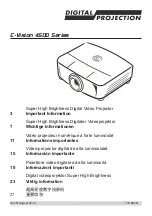
User Command Specifications
2. Communication Specifications
Transmissions sent from Projector to PC in response to commands from PC
<Response character string> <Delimiter>
The first two characters are always <one lowercase letter>:
The first character indicates the response type.
State response
i:OK i:BUSY etc.
Warning
w:USER_COMMAND..
Error
e:000B INVALID..
Reference command response
g:AVOL=10
Range request command response r:VKS=N, -50, 50
Delimiters for commands sent from PC
OK
<OK response character string>:=i:OK
BUSY
This response is sent when a command cannot be received during processing.
Wait for a few moments, and then try sending the command again.
<BUSY response character string>:=i:BUSY
> IMAGE=2
< i:BUSY
WARN
<Warning response character string>:= w:<Warning description>
> IMAGE=2
< w:USER_COMMAND_VERSION_IS_UPDATED
ERR
An error message is output.
<Error response character string>:= e:<Error code>
□
<Error message>
※
※
> abcdefg
< e:0002 INVALID_COMMAND
GET
Request response for each parameter.
<GET response character string>:=g<Parameter name>=<Value>
> GET LANG or ? LANG
< g:LANG=JPN
RANGE
This is the settable range response for each parameter.
> RANGE CONT
< r:CONT=N, -20, 20
WARN
response
ERR
response
GET
response
RANGE
response
<Response character
string>
Refer to “Error List”!
<Error code> is expressed as a four-digit hexadecimal number.
g
Example:
<Delimiters>
Response
Type
Type
Example:
After processing of each command is completed, a response is sent indicating that the next command
can be received.
e
This response is sent when warning information is issued.
Note that this command cannot be
executed.
<Range response character string> := r:<Parameter name>=<Type>, <Setting value range>
Transmission
format
Description
i
Character strings consisting of one or more ASCII characters.
w
Meaning
Response type
Example
r
Example:
Example:
Example:
OK
response
BUSY
response
※
<For <Setting value range> refer to the RANGE command.
PAGE 4










































